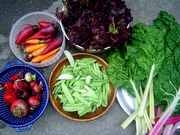

|
| Vegetable Varieties for Gardeners is a citizen science program
|
|
|
|
'Good King Henry' Spinach |
| |
| Sub-Category: |
Spring
|
| |
|
| Sub-Category 2: |
| | Description: |
Also known as Mercury and Lincolnshire spinach. Actually a different species Chenopodium bonus-henricus, a hardy, self-seeding, long-stalked perennial with arrow-shaped leaves. Leaves, flowers and roots are all edible.
|
| Days To Maturity: |
NA
|
| Seed Sources: |
|
| |
| Rating Summary |
| |
Overall: (4.0 Stars)
Taste: (3.0 Stars)
Yield: (3.0 Stars)
Ease/Reliability: (5.0 Stars) |
| |
| Reviews |
| |
Login to share your Review of Good King Henry.
Number of Reviews: 1
Posted Pictures by Reviewers:

KEY: O=Overall Rating, T=Taste, Y=Yield, E=Ease
Reviewed on 12/17/2017 by
tripleione
- An intermediate gardener
|
 Overall Overall
 Taste Taste
 Yield Yield
 Ease Ease
|
Buncombe, North Carolina, United States
Frost Free Season: 163 - 183 days
Soil Texture: Clay
Garden Size: Small - Less than 400 square feet (20' x 20')
Sun Exposure: 6 to 8 hours per day
|
| I\\\\\\\\\\\\\\\\\\\\\\\\\\\\\\\'ve been growing two GKH plants for a couple years now. I started my specimens from seed using the winter sowing method. Seeds are somewhat reluctant to germinate -- I only managed to get three seeds to sprout, and only two seedlings made it to maturity. However, the mature plants are extremely hardy. The shoots/leaves are some of the first to appear in the spring and one of the last to fade away in the winter. The picture I attached shows my best looking plant that has been sitting under two feet of snow for over a week, a testament to its hardiness.GKH produces tender shoots and leaves in the early spring that taste remarkably similar to spinach, if not a little bit more bitter. The texture is a little rougher than spinach leaves, especially as the temperature rise in late spring/early summer. It continues to put out palatable leaves throughout the year, although its growth slows considerably in the winter. Multiple plants must be grown for an adequate yield, but being a perennial means once you have it growing, it\'ll probably be in your garden for at least a few years. GKH is a slow grower, but the plants I am growing have increased dramatically in size each year. Although GKH might not replace spinach in terms of taste/texture, the ease of growing it (once you get the seeds to germinate, that is) and the fact that it returns year after year make it an attractive addition to any spring greens garden. |
 |
| |
|
|
|
|
Vegetable Varieties for Gardeners is a citizen science program, © 2004-2024, All Rights Reserved
Cornell Garden Based Learning, Cornell University College of Agriculture & Life Sciences, Horticulture Section
|







 VVfG home
VVfG home


